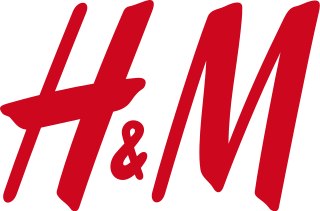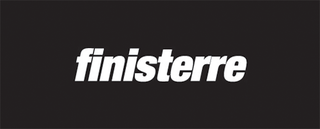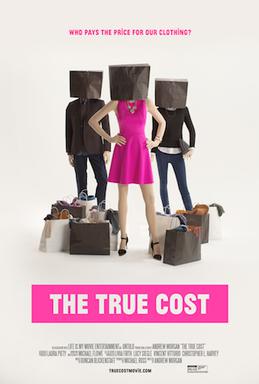Related Research Articles

Textile is an umbrella term that includes various fiber-based materials, including fibers, yarns, filaments, threads, different fabric types, etc. At first, the word "textiles" only referred to woven fabrics. However, weaving is not the only manufacturing method, and many other methods were later developed to form textile structures based on their intended use. Knitting and non-woven are other popular types of fabric manufacturing. In the contemporary world, textiles satisfy the material needs for versatile applications, from simple daily clothing to bulletproof jackets, spacesuits, and doctor's gowns.

H & M Hennes & Mauritz AB is a multinational fashion retailer headquartered in Sweden. Known for its fast fashion business model, H&M offers affordable clothing, accessories, and homeware. The company has a significant global presence, operating thousands of stores across 75 geographical markets and employing over 100,000 people worldwide.

Veja is a French footwear and accessories brand founded in 2004. Veja's products are made with organic cotton, natural rubber, leather and recycled plastic bottles.
Labour Behind the Label (LBL) is a UK-based non-profit co-operative organisation with an office in Easton, Bristol, which campaigns for workers' rights in the clothing industry. It is the platform of the international Clean Clothes Campaign in the United Kingdom. LBL's members include trade unions and their local branches, consumer organisations, campaign groups, and charities.

Oeko-Tex is a registered trade mark of the International Association for Research and Testing in the Field of Textile and Leather Ecology. It is used to represent the product labels and company certificates issued by the Association.

Fast fashion is the business model of replicating recent catwalk trends and high-fashion designs, mass-producing them at a low cost, and bringing them to retail quickly while demand is at its highest. The term fast fashion is also used generically to describe the products of this business model, particularly clothing and footwear. Retailers who employ the fast fashion strategy include Primark, H&M, Shein, and Zara, all of which have become large multinationals by driving high turnover of inexpensive seasonal and trendy clothing that appeals to fashion-conscious consumers.
Hannan Majid is a British documentary filmmaker.

Sustainable fashion is a term describing efforts within the fashion industry to reduce its environmental impacts, protect workers producing garments and uphold animal welfare. Sustainability in fashion encompasses a wide range of factors, including cutting CO2 emissions, addressing overproduction, reducing pollution and waste, supporting biodiversity and ensuring that garment workers are paid a fair wage and have safe working conditions.
Lucy Siegle is a British journalist and writer on environmental issues. She is a reporter on The One Show.

Safia Minney MBE FRSA is a British social entrepreneur and author. She was the founder of Global Village which she set up in 1991, and the founder and former Global CEO of 24 years of People Tree, a pioneering sustainable and Fair Trade fashion label. She is also a spokesperson and campaigner on Fair Trade and ethical fashion. She initiated World Fair Trade Day in 1999, which is endorsed by the World Fair Trade Organization and their members and celebrated on the second Saturday of May each year. Additionally, she wrote the books Naked Fashion:the New Sustainable Fashion Revolution, Slow Fashion, Aesthetics Meets Ethics and Slave to Fashion.
Factory Green, Inc., was an American, eco-friendly clothing and accessories online retail store and was based in Columbia, Missouri. Factory Green was co-founded in 2007 by Daniel Lyons, CEO, and Jack Short, President and Chairman. The company focused on offering "urban and trendy" environmentally friendly apparel, accessories, and apartment wares, marketing specifically to the college-aged demographic. The company offered both organic cotton and bamboo apparel manufactured in facilities running solely on wind and solar power. Factory Green donated a portion of its revenue to the United Nations Water For Life organization which provides clean water to under-served populations around the globe.

Bamboo textile is any cloth, yarn or clothing made from bamboo fibres. While bamboo was historically used only for structural elements, such as bustles and the ribs of corsets, in recent years various technologies have been developed that allow bamboo fibre to be used for a wide range of textile and fashion applications.
Wood-free paper is paper created exclusively from chemical pulp rather than mechanical pulp. Chemical pulp is normally made from pulpwood, but is not considered wood as most of the lignin is removed and separated from the cellulose fibers during processing, whereas mechanical pulp retains most of its wood components and can therefore still be described as wood. Wood-free paper is not as susceptible to yellowing as paper containing mechanical pulp. Wood-free paper offers several environmental and economic benefits, including reduced deforestation, decreased energy consumption, and improved waste management. The term Wood-free paper can be rather misleading or confusing for someone unfamiliar with the papermaking process because paper is normally made from wood pulp derived from trees and shrubs.

Finisterre is an outdoor apparel and surfwear company with a focus on functional and sustainable products. Based in St Agnes, Cornwall, and founded by Tom Kay in 2003, they are recognised as a cold water surf company.
People Tree is a Fair Trade apparel company founded in 1991. The Company no longer has a London base after laying off most UK staff in 2023 amid financial trouble but maintains an office in Tokyo. People Tree Ltd, the UK business, went into liquidation in September 2023 with debts of £8.5m. People Tree was one of the early proponents of Fair Trade and Ethical Fashion and was the first fashion company to be awarded the World Fair Trade Organisation Fair Trade product label.
Green textiles are fabrics or fibres produced to replace environmentally harmful textiles and minimise the ecological impact. Green textiles are part of the sustainable fashion and eco-friendly trends, providing alternatives to the otherwise pollution-heavy products of conventional textile industry, which is deemed the most ecologically damaging industry.
Green consumption is related to sustainable development or sustainable consumer behaviour. It is a form of consumption that safeguards the environment for the present and for future generations. It ascribes to consumers responsibility or co-responsibility for addressing environmental problems through the adoption of environmentally friendly behaviors, such as the use of organic products, clean and renewable energy, and the choice of goods produced by companies with zero, or almost zero, impact.

The True Cost is a 2015 documentary film directed by Andrew Morgan that focuses on fast fashion. It discusses several aspects of the garment industry from production—mainly exploring the life of low-wage workers in developing countries—to its after-effects such as river and soil pollution, pesticide contamination, disease and death. Using an approach that looks at environmental, social and psychological aspects, it also examines consumerism and mass media, ultimately linking them to global capitalism. The documentary is a collage of several interviews with environmentalists, garment workers, factory owners, and people organizing fair trade companies or promoting sustainable clothing production.

Slow fashion is an aspect of sustainable fashion and a concept describing the opposite to fast fashion, part of the "slow movement" advocating for clothing and apparel manufacturing in respect to people, environment and animals. As such, contrary to the industrial practices of fast fashion conglomerates, slow fashion involves local artisans and the use of eco-friendly materials, with the goal of preserving crafts and the environment which, ultimately, provides value to all, slow fashion brands, consumers and retailers.

The fashion industry, particularly manufacture and use of apparel and footwear, is a significant driver of greenhouse gas emissions and plastic pollution. The rapid growth of fast fashion has led to around 80 billion items of clothing being consumed annually, with about 85% of clothes consumed in United States being sent to landfill.
References
- 1 2 3 4 Roberts, Zoe. "THTC – Inspiring change; one Hip-Hop head at a time". B-Boy News. Retrieved 17 September 2015.
- 1 2 Pilcher, Tim (2005). Spliffs 3 : the last word in cannabis culture?. London: Collins & Brown. p. 96. ISBN 9781843403104.
- 1 2 Siegle, Lucy (2011). "Pick of the green crop". The Guardian. Guardian News and Media Limited. Retrieved 17 September 2015.
- ↑ Siegle, Lucy (30 January 2005). "Good buy: Visor from The Hemp Trading Company". The Observer. Guardian News and Media Limited. Retrieved 17 September 2015.
- ↑ Dryden, Sarah (8 February 2008). "Cutting-Edge Fashion With a Clear Conscience". New Consumer. New Consumer Ltd. Archived from the original on 1 December 2008. Retrieved 17 September 2015.
- 1 2 Sparkes, Matthew (19 February 2008). "THTC brings musicians on board with hemp". Smart Planet. CBS Interactive Limited. Archived from the original on 29 October 2008. Retrieved 17 September 2015.
- 1 2 Mogul, Priyanka (25 January 2012). "Urban legend: THTC takes environmentalism to the streets". The Ecologist. Retrieved 17 September 2015.
- Further reading
- Black, Sandy (2008). Eco-chic : the fashion paradox. London: Black Dog Pub. ISBN 9781906155094.